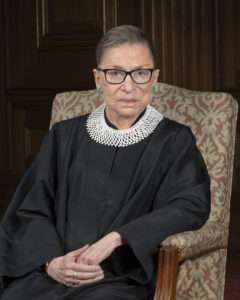The Volokh Conspiracy
Mostly law professors | Sometimes contrarian | Often libertarian | Always independent
Today in Supreme Court History: August 10, 1993
8/10/1993: Justice Ruth Bader Ginsburg takes oath.

Editor's Note: We invite comments and request that they be civil and on-topic. We do not moderate or assume any responsibility for comments, which are owned by the readers who post them. Comments do not represent the views of Reason.com or Reason Foundation. We reserve the right to delete any comment for any reason at any time. Comments may only be edited within 5 minutes of posting. Report abuses.
Please to post comments


Justices of the Supreme Court of the United States are required to take two oaths before they may execute the duties of their appointed office. This would be the constitutional and judicial oaths.
https://www.supremecourt.gov/about/oath/oathsofoffice.aspx
The video of Chief Justice Rehnquist giving her the constitutional oath can be found here:
https://www.docsteach.org/documents/document/ginsburg-swearing-in
He also gave her the judicial oath, privately.
https://supremecourthistory.org/scotus-scoops/rapid-ruth-ginsburg-joins-the-court/
Bowen v. Kendrick, 483 U.S. 1304 (decided August 10, 1987): Rehnquist notes that the Court always puts down for direct appeal a case where a district judge has declared an Act of Congress unconstitutional. So he refuses to lift the judge’s stay of enforcement of the D.C.’s Adolescent Family Life Act, which provided for funding of sexual counseling programs run by religious institutions. However on direct appeal, he wrote the opinion holding that the Act (heh) did not violate the Establishment Clause, 487 U.S. 589, 1988.
Heart of Atlanta Motel, Inc. v. United States, 85 S.Ct. 1 (decided August 10, 1964): Black refuses to stay district court orders enjoining restaurants from refusing to serve blacks (not people named Black; people who actually were black). Black (the man this time, not the race) states that a stay would in effect hold the Civil Rights Act of 1964 to be unconstitutional, something which only the full Court can do. (As we know, the Court upheld the district court and “whites only” public accommodations became illegal, 379 U.S. 241, 1964.)
Heckler v. Turner, 468 U.S. 1305 (decided August 10, 1984): Rehnquist stays enforcement of a disputed welfare rule (whether mandatory tax withholdings are a work expense or deducted from income), on which there was a split in the circuits, because Congress had just passed a law resolving the ambiguity. Unsurprisingly, the full Court ultimately decided in accordance with the new law (it’s a work expense -- ?? not helpful for the “working poor”!!), 470 U.S. 184, 1985.
The Civil Rights Act of 1964 WAS unconstitutional.
The fact it was desperately needed doesn't negate this fact.
By 'takes oath' do you mean lied, as was her wont?